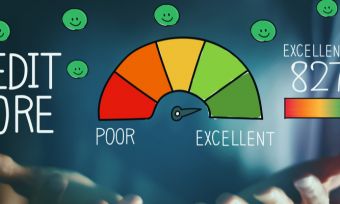Author: Nicola Field
Personal loans and credit cards are both popular financial products. But which is better – a personal loan or a credit card? There is no one-size-fits-all answer to this, as personal loans and credit cards are two very different options that both come with pros and cons.
Here is a closer look at personal loans and credit cards to help you decide which product can be better suited to certain needs.
How does a personal loan work?
Part of the appeal of personal loans is that they tend to be a very straightforward product.
Set borrowing over a fixed term
In most cases, a personal loan lets you borrow a set amount of money to be repaid over a fixed term – usually from 12 months to five or seven years.
The interest rate on a personal loan can be fixed or variable. One of the benefits of a fixed rate is that the repayments will stay the same throughout the loan term, which can make repayments easier to budget for. With a variable loan, the interest rate (and your repayments) can increase or decrease during the term. That’s great if the interest rate goes down, but not so great if rates climb.
Increasing flexibility
Personal loans are becoming more flexible. Some lenders allow extra repayments, which can help to pay off the debt sooner, thereby lowering the overall interest cost. Some loans allow you to make unlimited repayments, while others cap the amount. Be aware that some providers charge early repayment fees.
A handy feature related to extra repayments is redraw, which allows borrowers to access extra repayments they have made if they need the cash back. Not all personal loans offer this feature, however.
Wide range of loan purposes
While the purchase of a vehicle is generally the most common loan purpose, many lenders offer personal loans for a wide range of reasons, be it paying for travel, home improvements, further education or medical costs.
Searching for the Cheapest Personal Loan?
If you’re looking for the cheapest personal loan, Canstar’s personal loan comparison tables can help. The table below displays the sponsored unsecured personal loan products available on Canstar’s database for a three-year loan of $10,000 in Auckland, with links to lenders’ websites. Use Canstar’s personal loan comparison selector to view a wider range of products on Canstar’s database. Canstar may earn a fee for referrals.
Compare personal loans with Canstar
How does a credit card work?
Credit cards are a ‘revolving line of credit’. This means you can draw down funds up to a set credit limit, repay the money, then draw it down again at a later date. In this way, the credit offered by a credit card can revolve indefinitely, and you don’t need to reapply for more funds as you would with a personal loan.
Compare credit cards with Canstar
Interest-free days
Most credit cards come with an interest-free period, usually 44 or 55 days, before interest charges are added to your card balance. Interest-free days only apply if you pay off the card balance in full each month.
Interest charges are based on the card balance – not the credit limit
Interest charged on credit cards is based on your monthly card balance – not the credit limit. For example, you may have a credit limit of $5000, but if you only have an outstanding card debt of $500, interest is based on $500, not $5000.
As a plus, if you maintain a zero balance by paying off all your card purchases each month, you could potentially avoid paying any interest at all on a credit card.
Flexible card repayments
If you carry a card balance at the end of the statement period, the card issuer will only require you to make the minimum repayment. This can be set at as little as 2% of the outstanding debt.
Sticking to the minimum repayments may be easier on your budget compared to paying off the full balance, but it will increase the interest cost for the month, which is then added to the outstanding debt. In this way, it can take longer to clear the card balance and costs can grow significantly over time.
If possible, pay off as much of the card balance as you can each month to pay off the debt faster and save on interest.
Opportunities to earn reward points
Credit cards can be linked to reward programs where cardholders earn points based on their level of card spending. These rewards can then be redeemed for anything from airline flights to different types of merchandise.
For cardholders who can avoid credit card interest charges, these reward programs have the potential to score a few freebies. It’s worth stressing, though, that credit cards offering reward programs can come with a higher interest rate and higher annual fees.
So the ‘freebies’ may only be good value if you can consistently clear the card balance before interest charges apply.
→Related article: What Type of Credit Card Should I Get?
Complimentary insurance
Some credit cards offer complimentary insurance, including complimentary travel insurance and purchase protection insurance. Here too, though, it pays to consider if these types of extras can mean paying more in card fees or interest rates.
Which have higher interest rates – personal loans vs credit cards?
It’s always important to shop around for any financial product as costs vary widely between providers. As a general rule though, personal loans tend to have lower interest rates than credit cards.
Bear in mind, what you end up paying in interest can depend on the way you manage a credit card. Remember, you only pay interest on the outstanding credit card balance – not your credit limit. If you continually pay off your balance on time, it is possible to avoid paying any interest charges.
By contrast, interest on a personal loan applies to the amount outstanding, which is paid off over time.
Which have higher fees – personal loans vs credit cards?
Personal loans can come with a variety of fees including a one-off loan application fee, and, potentially, a monthly account-keeping fee. There can also be early repayment fees, depending on the loan.
Credit cards can come with fees, too. Some, though not all, credit cards charge annual fees. Both personal loans and credit cards can charge late payment fees if a regular repayment is missed. Fees may also apply if you exceed your card’s credit limit. Other possible fees include cash advance fees if you draw cash out of the card through an ATM, and foreign currency conversion fees, which may apply if you use your credit card while travelling overseas or to make international purchases online.
→Related article: No Annual Fee or Low Interest Credit Cards: What’s Better?
Weighing up which is better – personal loans vs credit cards
Both personal loans and credit cards have the potential to be extremely useful.
By providing a lump sum of funds, a personal loan can be a handy choice for big-ticket buys like a car, a holiday or new furniture. In fact, before taking out a loan you’ll need to get approval, and your lender will likely want to know what the loan will be used for. You may even be required to secure the loan against the purchase.
By contrast, once you get the initial approval for the card, the funds available through a credit card can be drawn down at any time, providing immediate access to credit. That credit can also be used on anything and everything, so long as it doesn’t exceed your credit limit.
That makes credit cards useful for people who have irregular income patterns or as a back-up for emergency bills or unexpected spending. Credit cards are also a lot more secure than cash, and can be useful if travelling.
To help you decide which is better for your needs – a personal loan or credit card, we sum up the main pros and cons to consider.
Personal loan
Advantages
- Interest rates tend to be lower compared to credit cards
- The loan can be paid off over a period of years, making repayments more manageable
- Personal loans come with a clear end date when the balance will be paid off
Disadvantages
- Interest is charged on the outstanding loan balance until it is paid off in full
- Loan establishment fees can be expensive
- It takes time to apply for and arrange a personal loan
Credit cards
Advantages
- The flexibility to access funds when you need money, up to a set credit limit
- Interest is only paid on the funds drawn down
- An interest-free period means it can be possible to avoid interest charges altogether
- Cash advances are usually available if money is needed in an emergency (but costs apply)
- Reward programs and extras like complimentary travel insurance may be available
Disadvantages
- Annual card fees may be charged and will apply every year, so the cost can add up over time
- The debt plus ongoing interest charges can quickly build up if cardholders only stick to the card issuer’s minimum repayments
- Access to a generous credit limit can make it tempting to overspend
No matter whether you choose a personal loan or credit card – or both – the main point is to shop around and compare different products looking at rates, fees and features to be confident you have the product best-suited to your needs. It’s also important to only borrow what you can afford to repay and indeed to consider carefully if taking on debt is appropriate for your situation.
Compare personal loans with Canstar
The table below displays some of the unsecured personal loan products available on Canstar’s database for a three-year loan of $10,000 in Auckland (some may have links to lenders’ websites). The products are sorted by Star Rating (highest to lowest) followed by company name (alphabetical). Use Canstar’s personal loan comparison selector to view a wider range of products on Canstar’s database. Canstar may earn a fee for referrals.
Compare personal loans with Canstar

About the reviewer of this page
This report was reviewed by Canstar Content Producer, Andrew Broadley. Andrew is an experienced writer with a wide range of industry experience. Starting out, he cut his teeth working as a writer for print and online magazines, and he has worked in both journalism and editorial roles. His content has covered lifestyle and culture, marketing and, more recently, finance for Canstar.
Enjoy reading this article?
You can like us on Facebook and get social, or sign up to receive more news like this straight to your inbox.
By subscribing you agree to the Canstar Privacy Policy




Share this article